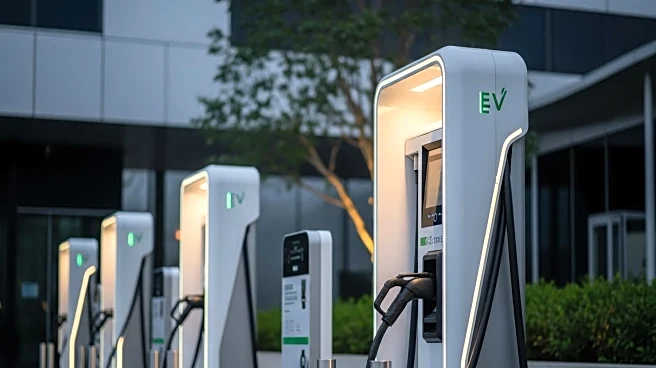What is the story about?
What's Happening?
German automotive leaders are urging the European Union to reconsider its planned 2035 ban on new cars with CO2-emitting combustion engines. During a recent meeting at the European Commission headquarters in Brussels, German car manufacturers requested the reversal of this ban and the relaxation of annual quotas for electric vehicle sales leading up to 2035. The EU is considering allowing hybrid cars to continue being sold post-2035, with a decision expected by December. This push from the automotive industry is part of a broader backlash against EU green initiatives, which have already seen the postponement or cancellation of several environmental regulations. The German car industry, which contributes significantly to the nation's GDP, is facing challenges from global competitors in the electric vehicle market.
Why It's Important?
The outcome of this lobbying effort by German automakers could have significant implications for the EU's climate goals and the automotive industry's future. A reversal of the 2035 ban could hinder efforts to reduce carbon emissions and transition to sustainable transportation. The German car industry, already lagging in electric vehicle production, risks losing competitiveness if it fails to adapt to zero-emissions driving. The industry's resistance to change is also linked to concerns about job losses, as it employs a substantial workforce. However, maintaining the status quo may not prevent job cuts, as the industry faces pressure to innovate and compete globally.
What's Next?
The European Commission is expected to make a decision by December regarding the potential allowance of hybrid vehicles post-2035. This decision will be crucial in determining the direction of EU environmental policy and the automotive industry's adaptation to new regulations. Stakeholders, including environmental groups and electric vehicle manufacturers, are likely to continue advocating for strict adherence to the 2035 ban to ensure progress towards climate goals. The German car industry may need to accelerate its transition to electric vehicles to remain competitive and mitigate potential job losses.
Beyond the Headlines
The debate over the 2035 ban highlights the tension between economic interests and environmental responsibilities. The German car industry's influence on national identity and economy gives it significant leverage in policy discussions. However, the industry's historical resistance to change, as seen in the 2015 diesel scandal, raises questions about its commitment to sustainable practices. The EU's decision will reflect its stance on balancing industrial interests with environmental imperatives, potentially setting a precedent for future regulatory approaches.















